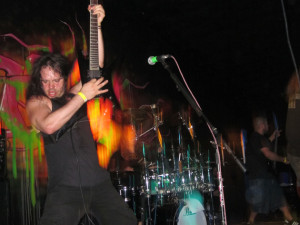 Originating from Kansas in 1998, Origin contrive unprecedented mastery of musicianship and merge cosmic and horror concepts to differentiate themselves from the slew of other technical death metal bands.
Originating from Kansas in 1998, Origin contrive unprecedented mastery of musicianship and merge cosmic and horror concepts to differentiate themselves from the slew of other technical death metal bands.
Their debut album Origin established a well-rounded sound that would cater to casual death metal listeners, as well as those who approach the genre looking for the most technically proficient of brutal wizardry. Since then, Origin have released four more albums and are in the process writing the next one.
We are fortunate to have virtuosic guitarist Paul Ryan reveal the happenings of Origin.
You’re currently writing material for your next album. What do you hope to accomplish with your next release? Will there be new elements that Origin hasn’t expressed yet?
A continuation in the development in the sound of the band. I guess that the thing for me is that I am a old metalhead who enjoys a lot of different styles of metal which in the early days of the band I only presented a more straight-forward stylistic approach… I am using a couple of ideas from the past in technique and in dynamics to not present the same album again… I hope to keep both old and new listeners entertained by something fresh on every Origin album… During our live shows while playing I kept asking myself what can we bring to our live set that we don’t have yet… I feel that is what influenced my writing the most!
You’ve been ranked as one of the best guitarists in metal by several publications. Do you have any advice for guitar players that hope to advance their technical abilities?
Well I must say it comes with practice, practice, practice. There wasn’t Youtube or professional lessons online when I was growing up & now there are so many resources out there today to assist a young emerging guitarist to get very good, very fast. Something that I’ve noticed in today’s generation is that it isn’t always about composition on a computer, but being in the garage with other musicians brainstorming ideas & grinding it out (some of the funnest moments as a musician I’ve ever had). I spent many days of my life going to shows/practices just learning about how other bands worked as well.
A lot of Origin’s lyrics and titles encompass how small and minuscule our existence is. Is there a philosophical standpoint behind the band or is this something that’s derived from general contemplation?
Prior to Origin I played Death metal with typical Death Metal lyrics. Once I realized that I wasn’t going to kill anyone (unfortunately a few friends of mine did), I wanted to find something to write about that wasn’t so singularly based. Sci-fi & Horror always entertained me & Music took me away from the hell that I heard in my head. It was a positive release of negative energy. I was just looking for something that was endless that could be written about… The unknown.
So, Origin’s listeners can assume that you desire to reach a more broad scope to what the band wants to convey? Not just about blasphemy, blood and guts, but about a more meaningful or challenging way to look at life as a whole? Something that each individual ponders about, but may have a different take on?
When i’m listening to music & reading the lyrics I want to go on a Cerebral Journey. I hope that in some way my music can take someone out of the moment of their own personal life & just sit back & listen to music. I dunno if there is personal enlightenment in our message other than I hope we are conveying some new topics to think about.
What bands have inspired you over the years? Which are your favorites? Can you pinpoint any musicians that have had a profound influence on you?
Well in the very beginning of my playing it was Slayer, Celtic Frost, Cryptic Slaughter, & Yngwie Malmsteen. These bands influenced my early playing style & eventually crafted what I am today. Death, Napalm Death, Suffocation, Early Carcass, Early Deicide, and Bolt Thrower had a lot to do with it as well.
What are your hobbies outside of music?
Music is my life. I work in a music store. Other than playing music I enjoy exercise & spending time with my girl, going to shows & MORE GUITAR!
Origin has extensively toured over the years and has succeeded in reaching a very broad metalhead fanbase. Which shows have been the most memorable?
Oh man there are too many to name… You always remember your first & last I guess… Every show has HAD ITS MOMENTS OF INSANITY!!! Always playing a new venue, city, or country is a pleasure. My mentality has been this..
Every show. Every Fan. Every City. Every State. Every Country. Every Time…
I try to give it my all every time. I want people to enjoy a show they paid for no matter the turnout whether its a 100 or a 1000.
You’ve enlisted Lonegoat from Goatcraft to aid with some synthesizer work for the next album. How did this come to be?
Basically as a musician on the road you get guys handed cds by many other musicians… I try to listen to everything that I get…. Once you get something good you don’t forget it. One night of driving all night to the next gig I popped in a cd that took me on a journey!!! I listened to the album all night on repeat!!! Basically I just contacted him directly & said I really enjoy your work & I have a piece of music that fits what you do perfectly!!! Hopefully we can put something else together as well!!!
Many guitarists treasure their gear and guitars. What’s your current setup like? What will you use on the next album?
I use a Jackson Warrior w Emgs
Mesa Boogie Stereo 100 power amp
RecPre Dbx166xl compressor-limiter-noise-gate
a bbe Sonic Maximizer 882e
Mesa Boogie cabs
Monster Cables
Do you think your sound is evolving? If so, from what and to what?
Yeah to the outside world. I am very private & most of my music isn’t ever heard by Origin fans…I have literally hundreds of riffs that didn’t make it to a Origin album that I enjoy playing; it’s just that the Death Metal scene is very singular in what they want to hear on a album. I think I have learned a lot about the guitar since the beginning of this band & feel that most fans only enjoy what they hear first from a band… To say that my earlier work is stronger than my latter is comical as a musician.
What genre is Origin’s music? What are the primary influences on that genre as a whole?
DeathShred!!!
I hear a lot Origin’s influence in the Death/Grind/Core scene today… I am very humbled by that.
A lot of your earlier music had themes to it. Are you going to continue along that direction, or relax a little and get more down-to-earth?
Well we are still in the writing process for the next album, so I can’t give you a correct answer to that. We are very excited to see & hear what this lineup can bring with Jason Keyser contributing to this album vocally & lyricaly… It will be Origin, but even in just the new demoing of the material Jason has a different approach which I feel will add another dimension to the music!!
Entering the studio for the next album in January so expect a spring/summer release on Nuclear Blast Records in 2014
Also in the mix is re-releasing A Coming Into Existence with Bonus material of the bands I was in before Origin & the DVD is slowly becoming a reality!!!
Thanks for the interview!!!
Visit Origin’s facebook page here.
2 CommentsTags: death metal, Origin, Paul Ryan, Technical Death Metal, tek-deth

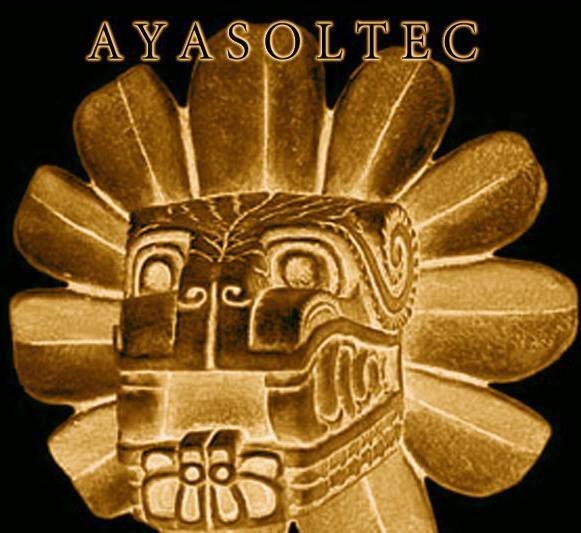
 Originating from Kansas in 1998,
Originating from Kansas in 1998, 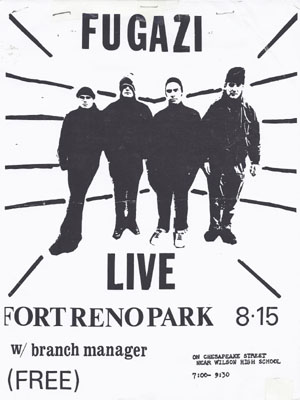
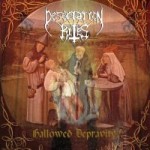 As if poisonous arachnoids had woven a sticky web around a hermit of the desolate Pampas, the multitude of savage Angelcorpsean riffs blasts from Desecration Rites’ rehearsal room with hardly any control or structure for the confounded listener to immerse in. The Argentinian blackened death duo did not have the time to execute all matters properly here because of unfortunate circumstances, and it shows in the deprecated, spastic rhythm of machine, the hysterical frequency and bouts of unclean guitar work all over the place. If something is keeping these dogs of sequences under leash, it is the deep, rumbling voice of Wolf intoning Faustian misery from the bottomless depths of darkness, occasionally unwinding power lines of similar effect to Craig Pillard’s majestic demon voice in the eternally classic Onward to Golgotha. For the modern death metal fan expecting a digitized, synthetic robot surgery there is probably no more horrific sight than this deluge of an album, but internally it is far more hypnotic, intricate and deadly than one could hope for. Just listen to the freezing pseudo-Nordic moments of “Death Sentence to an Agonizing World” or the ethereal, solar and jarring interlude of “Carnal Dictum” and you might just get a slight moment of hope in the future generations after all.
As if poisonous arachnoids had woven a sticky web around a hermit of the desolate Pampas, the multitude of savage Angelcorpsean riffs blasts from Desecration Rites’ rehearsal room with hardly any control or structure for the confounded listener to immerse in. The Argentinian blackened death duo did not have the time to execute all matters properly here because of unfortunate circumstances, and it shows in the deprecated, spastic rhythm of machine, the hysterical frequency and bouts of unclean guitar work all over the place. If something is keeping these dogs of sequences under leash, it is the deep, rumbling voice of Wolf intoning Faustian misery from the bottomless depths of darkness, occasionally unwinding power lines of similar effect to Craig Pillard’s majestic demon voice in the eternally classic Onward to Golgotha. For the modern death metal fan expecting a digitized, synthetic robot surgery there is probably no more horrific sight than this deluge of an album, but internally it is far more hypnotic, intricate and deadly than one could hope for. Just listen to the freezing pseudo-Nordic moments of “Death Sentence to an Agonizing World” or the ethereal, solar and jarring interlude of “Carnal Dictum” and you might just get a slight moment of hope in the future generations after all.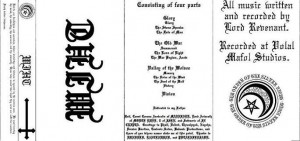 This British debutant lets loose the heathen wolves of war with a triumphant fanfare akin to Vlad Tepes’ famous Wladimir’s March before leading us to a journey of mountainous black metal landscapes, Graveland-esque meditations, ancient English fire-lit caves and Zoroastrian philosophy. The same sort of extended pagan tremolo epics (18 minutes of length at worst) that made countrymen Forefather and Wodensthrone veritable trials to sit through are pretty close at hand here, but the sparkling energy of youth helps a lot; there is a wildness and intrigue that contributes variation in sense even when there is none in content. Much of the logic of the songs seems to be emotionally stringing disparate sequences into a journey or a fictional narrative, which is essentially never a bad choice but some of the material here could be cut off to be brutally honest. Sound quality is the pseudo-spatial vacuum of too much reverb common for demo-level bands, but the instruments are clearly audible and the mid-rangeness is efficaceous. Unmoving and halfhearted chants and throwaway happy riffs are the blight of heathen metal, but Lord Revenant possesses sufficient pathos to allude to traces of occult evil and memories of ancient war at the same time; while this effort is not enough to coin him as a master of British metal, it would be a disappointment to hear these same songs performed by a more professional, disinterested voice in the future, or see him disappear without a trace after such a promising start.
This British debutant lets loose the heathen wolves of war with a triumphant fanfare akin to Vlad Tepes’ famous Wladimir’s March before leading us to a journey of mountainous black metal landscapes, Graveland-esque meditations, ancient English fire-lit caves and Zoroastrian philosophy. The same sort of extended pagan tremolo epics (18 minutes of length at worst) that made countrymen Forefather and Wodensthrone veritable trials to sit through are pretty close at hand here, but the sparkling energy of youth helps a lot; there is a wildness and intrigue that contributes variation in sense even when there is none in content. Much of the logic of the songs seems to be emotionally stringing disparate sequences into a journey or a fictional narrative, which is essentially never a bad choice but some of the material here could be cut off to be brutally honest. Sound quality is the pseudo-spatial vacuum of too much reverb common for demo-level bands, but the instruments are clearly audible and the mid-rangeness is efficaceous. Unmoving and halfhearted chants and throwaway happy riffs are the blight of heathen metal, but Lord Revenant possesses sufficient pathos to allude to traces of occult evil and memories of ancient war at the same time; while this effort is not enough to coin him as a master of British metal, it would be a disappointment to hear these same songs performed by a more professional, disinterested voice in the future, or see him disappear without a trace after such a promising start.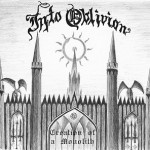 More than one and a half hours of harsh, pummelling death metal is neither a mean feat to compose nor to listen. As if Wagner, Brahms or even Stravinskij decided in the otherworld that these wimpy rock/metal kids have had it too easy and possessed various souls to spend hundreds of nights writing progressive Romantic/Faustian death metal partitures, 20+ minute pieces such as the title track or “On the Throne’s Heavenward” lumber and crush with such interminable weight that it is hard to not feel like attacked by a divine hammer from above as designed by Gustave Doré. You can forget about them mosh parts, since this is material about as brainy as anything by Atheist, with slow-moving adagios and creeping crescendos more familiar from Brian Eno’s ambient music or Esoteric’s hypno-doom than anything in satanic metal realm. Vocals are sparse and it feels like about a half of the album is purely instrumental and this creates a strange calm suspension which might even feel uncomfortable; but compared to The Chasm’s mastery of technique, it still does feel like an essential emotional counterpoint or rhythmic pulse bestowing element is missing, and when the cruel vocals suddenly rip the air, it might even be perceived as a disturbance to the solemn atmosphere. Nevertheless, it is probable that they are going for exactly this synthesis of the intellectual and the primal; the emotional and the physical. So fortress-like, rational, calm and measured that it is hard to connect its spirituality with its death metal origins (even the previous Into Oblivion release), it is certainly an important statement while the cumbersome nature and certain academicism in construction (perhaps “filler” in metal language, the problem of the previous album as well) makes it a bit of an unlikely candidate for casual listening. Anyone interested in the future of Death Metal cannot afford to miss it, though.
More than one and a half hours of harsh, pummelling death metal is neither a mean feat to compose nor to listen. As if Wagner, Brahms or even Stravinskij decided in the otherworld that these wimpy rock/metal kids have had it too easy and possessed various souls to spend hundreds of nights writing progressive Romantic/Faustian death metal partitures, 20+ minute pieces such as the title track or “On the Throne’s Heavenward” lumber and crush with such interminable weight that it is hard to not feel like attacked by a divine hammer from above as designed by Gustave Doré. You can forget about them mosh parts, since this is material about as brainy as anything by Atheist, with slow-moving adagios and creeping crescendos more familiar from Brian Eno’s ambient music or Esoteric’s hypno-doom than anything in satanic metal realm. Vocals are sparse and it feels like about a half of the album is purely instrumental and this creates a strange calm suspension which might even feel uncomfortable; but compared to The Chasm’s mastery of technique, it still does feel like an essential emotional counterpoint or rhythmic pulse bestowing element is missing, and when the cruel vocals suddenly rip the air, it might even be perceived as a disturbance to the solemn atmosphere. Nevertheless, it is probable that they are going for exactly this synthesis of the intellectual and the primal; the emotional and the physical. So fortress-like, rational, calm and measured that it is hard to connect its spirituality with its death metal origins (even the previous Into Oblivion release), it is certainly an important statement while the cumbersome nature and certain academicism in construction (perhaps “filler” in metal language, the problem of the previous album as well) makes it a bit of an unlikely candidate for casual listening. Anyone interested in the future of Death Metal cannot afford to miss it, though.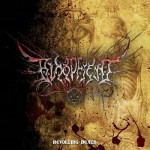 Heirs to the bludgeoning power of Escabios and other ancient compatriots, this recent Argentinian sect wastes no time with progressive anthems, intros nor filler in this concise EP of Autopsy influenced memoirs of early 90’s scathing death metal savagery. If the band has capacity for a challenging composition or a range of emotion, it’s all but hidden in this conflict of vulgar and intense demo taped riffs that could originate on any scummy cassette dug up from your older brother’s cardboard box vaults. Even most crustcore bands could hardly resist the temptation to fill the gaps out with something more liberal, but I am glad Bloodfiend do not resort to any loose pauses in their old school attack. The band is not yet quite there in the top ranks of death metal resurgence, but possess more than their share of contagious energy that will make for a good live experience and raise hopes for a more dynamic album.
Heirs to the bludgeoning power of Escabios and other ancient compatriots, this recent Argentinian sect wastes no time with progressive anthems, intros nor filler in this concise EP of Autopsy influenced memoirs of early 90’s scathing death metal savagery. If the band has capacity for a challenging composition or a range of emotion, it’s all but hidden in this conflict of vulgar and intense demo taped riffs that could originate on any scummy cassette dug up from your older brother’s cardboard box vaults. Even most crustcore bands could hardly resist the temptation to fill the gaps out with something more liberal, but I am glad Bloodfiend do not resort to any loose pauses in their old school attack. The band is not yet quite there in the top ranks of death metal resurgence, but possess more than their share of contagious energy that will make for a good live experience and raise hopes for a more dynamic album.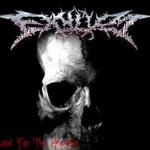 Brutal death metal cliches abound but also tasteful dashes of improvisational riff integration as California youth Exylum strike from the bottomless depths with a manifest of fragmented ideas like old Cannibal Corpse, Finnish death metal and newer black metal in a blender. Weird effected voices cackle, pinch harmonics abound, chugging is all but industrial metal, drumming provides a solid backbone and the ululation of the lead guitar harmonic reaches a hysterical plane of existence when the band lets go of identity expectations and go ballistic as in the end of “Worshiping the Flesh Eating Flies”. The worst thing on this demo is the tendency to fill space with something simple and stupid like the endless low tuned one note rhythmic hammering towards the end of the title track. When the band is in a more chaotic mode, as in the older recording “Ritual Crucifixion”, the confusion serves to imbue the composition with more blood and action.
Brutal death metal cliches abound but also tasteful dashes of improvisational riff integration as California youth Exylum strike from the bottomless depths with a manifest of fragmented ideas like old Cannibal Corpse, Finnish death metal and newer black metal in a blender. Weird effected voices cackle, pinch harmonics abound, chugging is all but industrial metal, drumming provides a solid backbone and the ululation of the lead guitar harmonic reaches a hysterical plane of existence when the band lets go of identity expectations and go ballistic as in the end of “Worshiping the Flesh Eating Flies”. The worst thing on this demo is the tendency to fill space with something simple and stupid like the endless low tuned one note rhythmic hammering towards the end of the title track. When the band is in a more chaotic mode, as in the older recording “Ritual Crucifixion”, the confusion serves to imbue the composition with more blood and action.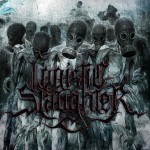 As persistence is the key to cosmic victory, it’s gratifying to see that this recent Californian cluster is not giving up in their quest to build a maiming death metal experience which was approached with streamlined Bolt Thrower and Cannibal Corpse tendencies in their last year’s EP. First threatening edges noted by the listener here are their improved musicianship with plenty of rhythmically aware palm-muting and tremolo NY style rhythm guitar riffs interlocking like the paths of ferocious large insects on flight while in the new drummer Kendric DiStefano they have a redeemer from the abhorrent pit of drum machine grind, even though his style tends to approach the robotic at times. The moments where this EP shines is when the brutal backbone operates at the behest of melody conjured by the leads of Mike Flory and Daniel Austi, such as the gripping mid-section of “Exit Wounds” and the Nile-ish mad arab string conjuration in “Litany of Blood”. I’m still reluctant to call this a total winner because there’s a lot of random chugging around as in generic bands from Six Feet Under to Hypocrisy, but there are also subtle technical flourishes such as the lightly arpeggiated bridge in “War Machine” that still keeps me liking this band and following its movements.
As persistence is the key to cosmic victory, it’s gratifying to see that this recent Californian cluster is not giving up in their quest to build a maiming death metal experience which was approached with streamlined Bolt Thrower and Cannibal Corpse tendencies in their last year’s EP. First threatening edges noted by the listener here are their improved musicianship with plenty of rhythmically aware palm-muting and tremolo NY style rhythm guitar riffs interlocking like the paths of ferocious large insects on flight while in the new drummer Kendric DiStefano they have a redeemer from the abhorrent pit of drum machine grind, even though his style tends to approach the robotic at times. The moments where this EP shines is when the brutal backbone operates at the behest of melody conjured by the leads of Mike Flory and Daniel Austi, such as the gripping mid-section of “Exit Wounds” and the Nile-ish mad arab string conjuration in “Litany of Blood”. I’m still reluctant to call this a total winner because there’s a lot of random chugging around as in generic bands from Six Feet Under to Hypocrisy, but there are also subtle technical flourishes such as the lightly arpeggiated bridge in “War Machine” that still keeps me liking this band and following its movements.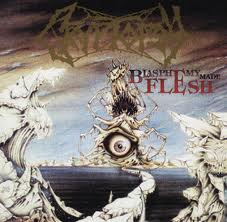
 A refreshingly explosive album, the intensity of Blasphemy Made Flesh reveals an unrelenting desire to exhume much of the prerequisite spirit necessary to create a genuine death metal record. Exuberant, joyful and multifaceted Blasphemy Made Flesh employs indefatigably demented and blistering motifs and phrases to create omniscient and nihilistic visions of the perennial struggle between victim and victimizer. In so doing the listener is effectively reminded of this one eternal fact- that wolves lie in wait among the unsuspecting. Exploited down stroke technique combined with the resulting texture compounds this experience leaving one with the impression of being violated both physically and mentally with a blunted weapon. Left battered and bruised the listener is urged to synthesize and understand the presented raging struggles and their psychological implications.
A refreshingly explosive album, the intensity of Blasphemy Made Flesh reveals an unrelenting desire to exhume much of the prerequisite spirit necessary to create a genuine death metal record. Exuberant, joyful and multifaceted Blasphemy Made Flesh employs indefatigably demented and blistering motifs and phrases to create omniscient and nihilistic visions of the perennial struggle between victim and victimizer. In so doing the listener is effectively reminded of this one eternal fact- that wolves lie in wait among the unsuspecting. Exploited down stroke technique combined with the resulting texture compounds this experience leaving one with the impression of being violated both physically and mentally with a blunted weapon. Left battered and bruised the listener is urged to synthesize and understand the presented raging struggles and their psychological implications.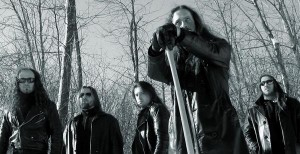 However, despite the pummeling and crushing riff-work an acknowledged necessity of contrast is utilized to create ambiguous moods of contemplation from whence the deranged seemingly view the hideous work wrought upon their most recent victim. In addition to this, the rhythmically dynamic nature of this record fosters the development of a structurally complex album as Cryptopsy utilize a tactful rhythmic precision that through its capacity to delicately change the complexion of motifs, somewhat rivals the expert precision of Suffocation. It is in fact here that we discover much of the vaunted complexity of Cryptopsy, where motifs are manipulated via rhythmic dynamics, and while this may come across as tedious and perhaps overused to some, such technique creates an interesting layer of ever shifting context which listeners are challenged to follow and to interpret. These elements combined with an esoteric yet absurd and morbid sense of melody make this album a twisted and cryptic work whose seemingly contradictory elements point to higher level from whence this work must be contemplated. Although some tracks lack a consistently coherent narrative and may seem erratic at times, expert use of technique, brutality and vision combined with a haughty and commendable sense of ambition makes this work enduring and enjoyable.
However, despite the pummeling and crushing riff-work an acknowledged necessity of contrast is utilized to create ambiguous moods of contemplation from whence the deranged seemingly view the hideous work wrought upon their most recent victim. In addition to this, the rhythmically dynamic nature of this record fosters the development of a structurally complex album as Cryptopsy utilize a tactful rhythmic precision that through its capacity to delicately change the complexion of motifs, somewhat rivals the expert precision of Suffocation. It is in fact here that we discover much of the vaunted complexity of Cryptopsy, where motifs are manipulated via rhythmic dynamics, and while this may come across as tedious and perhaps overused to some, such technique creates an interesting layer of ever shifting context which listeners are challenged to follow and to interpret. These elements combined with an esoteric yet absurd and morbid sense of melody make this album a twisted and cryptic work whose seemingly contradictory elements point to higher level from whence this work must be contemplated. Although some tracks lack a consistently coherent narrative and may seem erratic at times, expert use of technique, brutality and vision combined with a haughty and commendable sense of ambition makes this work enduring and enjoyable.

